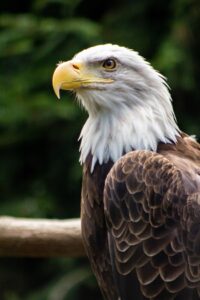Education a key priority discussing during latest Anishinabek Nation UNDRIP engagement session
 ANISHINABEK NATION TERRITORY— The Anishinabek Nation Legal Department continues to host its United Nations Declaration on the Rights of Indigenous Peoples (UNDRIP) Act virtual engagement sessions with the third in the series held on August 10.
ANISHINABEK NATION TERRITORY— The Anishinabek Nation Legal Department continues to host its United Nations Declaration on the Rights of Indigenous Peoples (UNDRIP) Act virtual engagement sessions with the third in the series held on August 10.
Anishinabek First Nations leaders and citizens were invited to participate in the Miigizi (Eagle) Dodem (clan) session exploring themes about UNDRIP and discussing priorities including but not limited to Education, Cultural, Language, and other relevant matters.
An introduction to UNDRIP was discussed and shortly thereafter, the Miigizi (Eagle) Dodem session was led by Leanna Farr, Anishinabek Nation’s Legal Counsel. The roles and responsibilities of the Miigizi Dodem were presented, including an explanation on how the dodem has a role as spiritual leader and it is responsible for passing on oral histories, traditional stories, ceremonies, and providing guidance.
The First Nation history and how government policies made concerted efforts to eradicate First Nations languages and the consequences of this eradication are still being felt.
“When our children were born and welcomed into the world and into our communities by ceremony, the first language our children heard was Anishinaabemowin and this was important,” stated Nokomis Elsie Bissaillon, participant and member of the Getzidjig Advisory Council.
Participants voiced that presently, there are many barriers to preserving the languages. For instance, our Anishinabek Getzidjig (Elders) who speak fluently and are not recognized to teach the language, and more importantly, are not recognized as being bilingual, in many non-Indigenous institutions. Bilingualism has been formalized in Canada’s federal language policy and also guarantees recognition of minority languages, yet, unfortunately, new research shows a slight decline in the number of people who can speak an Indigenous language.
Concerns surrounding education arose including policies regarding funds for college education; the need to allow for lifelong learning; increases to living allowances; a need to expand education policies to include transitions to new careers; or in-demand occupations, perhaps a second career clause. Also, an exemption clause from funding allows for individuals wanting to learn and be certified in their First Nation language. Other educational matters include when communities do not have high schools and youth need to attend in cities, there is no available funds for parents to temporarily move into the city and live with youth; however, there are funds available for youth to board with strangers in the cities. Participants expressed how there should be consistency on programs and the level of education received for children on the First Nation and/or within cities (i.e., breakfast programs, cultural activities and Indigenous languages). In order to revitalize language, it is critical to have children learning the language from birth — a suggestion was to have Indigenous immersion schools.
Many brought forth the need to have protections for the culture, ceremonies, sacred items (turtle rattles, etc.), traditional medicines (cedar, willow bark, etc.), traditional foods (wild rice, wild meats), and historical pictographs need protection. These pictographs tell a story, teach about historical movement, or provide a teaching (i.e., of a specific plant or the lake). Other concerns of fairness, such as why can’t Indigenous people bring traditional meat such as a moose to the butcher? Participants identified legal challenges and other barriers to traditional food harvesting and sharing activities (particularly in urban settings where these traditional meats are used for feasts). Feasts are part of the culture and because of safety regulations, Indigenous organizations cannot have wild meats offered to public.
It is, however, acknowledged that there has been movement towards change and acceptance of First Nations traditional activities. As an example, the Ontario court system now allow for the Miigizi Miigwan (Eagle Feather) to be utilized as the swearing of the truth, as the Miigizi Miigwan is held in high regard in the culture. The Anishinabek Nation Child Well-Being Law is an example of First Nations asserting inherent jurisdiction in the realm of child well-being. The Anishinabek Nation Child Well-Being law is currently implemented in 22 of its member First Nations. Each First Nation developed community standards that were based on their traditional and cultural practices.
The Anishinabek Nation encourages Anishinabek Nation First Nations leadership, staff, and citizens to assist in embarking on changing Indigenous history and paving a way forward towards improving the road ahead for future generations. Citizens are welcome to attend the upcoming virtual sessions to bring forward critical feedback and/or matters as they relate to the key aspects of UNDRIP. The Anishinabek Nation will be gathering all feedback provided on what Anishinabek would like to see in Canada’s 10-year action plan and what changes need to happen within federal legislation over the next decade. A report will be submitted to the federal government outlining feedback and identifying priorities of needed federal legislative change.
The next virtual engagement session will be hosted on August 24, featuring the Ajiaak (Crane) Dodem, which involves discussions about Family Relations, Matrimonial Real Property, and youth.
Other upcoming sessions include:
- September 7, 2022: Shiikenh (Turtle) Dodem – Justice, and Criminal Law;
- September 21, 2022: Maang (Loon) Dodem – Equality and Discrimination, Wills and Estates, Employment and Labour, Human Rights; and
- October 5, 2022: Mukwaa (Bear) Dodem – Health, Policing, Military, and other issues.
If you or anyone from your First Nation would like to participate in these sessions or would like to request a separate session, please contact Anishinabek Nation’s Justice Manager Kristy Jones: kristy.jones@anishinabek.ca.
Virtual engagement sessions registration available here.


